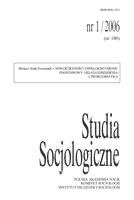Konsens i jednorodność społeczna w procesie budowania kapitalizmu w krajach postkomunistycznych
The Role of Consensus and Social Homogeneity in the Process of Building Capitalism in Post-communist Countries
Author(s): Jacek BielińskiSubject(s): Social Sciences
Published by: Instytut Filozofii i Socjologii Polskiej Akademii Nauk
Keywords: social consensus; social homogeneity; post-communist transformations; economic sociology
Summary/Abstract: The focus of this article is on interpretation of progress of post-communist transformations. Classical approaches, particularly those of Max Weber and Karl Polanyi, rather than modern ones are used as basis for the empirical analysis. I argue that the success of capitalist project, both now and in the past, stems from the ability to work out a general consensus about the preceding economic order. I also claim that ethnic homogeneity can be a favorable factor for the post-communist transformation, especially in its initial phase. Moreover, unlike in fully developed market systems which are more stable and socially diverse, the success of market reforms in post-communist countries negatively correlates with their diversification. One of the main goals of this analysis is to describe empirically what this consensus refers to. Survey research shows that market reforms in former socialist block run more smoothly if the level of social consensus about key values, not necessarily liberal, is high. I analyzed values and attitudes defining the consensus and also the degree of their popularity among economic elites and non-elites. Data used in the analysis comes from the first edition of European Social Survey.
Journal: Studia Socjologiczne
- Issue Year: 180/2006
- Issue No: 1
- Page Range: 89-118
- Page Count: 29
- Language: Polish

